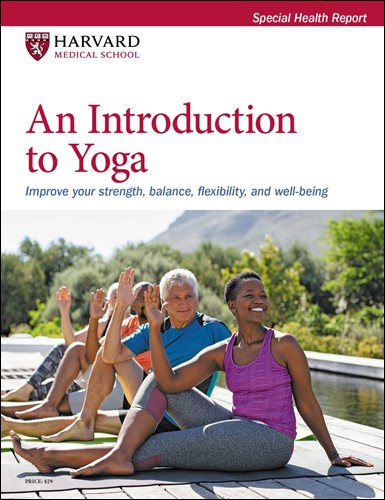Yoga: A gateway to healthier habits?
This mind-body practice may improve heart-related risks by helping you manage stress and lifestyle changes more easily.

Popular culture often depicts yoga as an exercise for slender, flexible, younger women. But scores of people — including older men — have been practicing yoga for thousands of years. Today, yoga’s popularity among the general population continues to rise, along with evidence supporting possible benefits for people with heart disease (see "Yoga and heart disease: The latest data").
"The beauty of yoga is that it addresses multiple factors that underlie heart disease," says yoga researcher and neuroscientist Dr. Sat Bir Singh Khalsa, assistant professor of medicine at Harvard Medical School. Whether you have chest pain from narrowed heart arteries (angina) or an irregular, fast heartbeat (atrial fibrillation), yoga can cultivate physical changes that may improve these and other cardiovascular conditions, he says.
Yoga and heart disease: The latest dataHundreds of studies have explored how yoga might improve heart health. But only a few have directly compared yoga to another treatment (usually standard medical care) in a randomized controlled trial — the gold standard of research studies. Earlier this year, researchers published a review of yoga’s potential benefits in people with coronary artery disease in Complementary Therapies in Medicine. From more than 300 potentially relevant studies, they identified seven clinical trials that compared yoga — done anywhere from one to 14 times a week for at least a half-hour per session — to usual care or exercise. Yoga was linked to improvements in blood pressure, cholesterol and triglyceride levels, body mass index, and quality of life. Yoga may also be an effective add-on therapy for people with heart rhythm disorders. For those with atrial fibrillation (a rapid, irregular heartbeat that usually occurs sporadically), some studies suggest that practicing yoga regularly may help reduce the number of episodes they experience. Another found that yoga may help reduce palpitations, a usually harmless condition that feels as though the heart is pounding or has skipped a beat. |
Physical changes
All types of yoga (including gentle or beginner styles) can enhance your strength, flexibility, and balance — important but often overlooked aspects of overall physical fitness and well-being. Yoga fosters better sleep, which helps prevent or improve a host of health conditions linked to heart health, including depression and obesity. Yoga also encourages slow, deep breathing, which helps lower blood pressure and heart rate. And over time, a regular yoga practice trains your nervous system to be less reactive during periods of stress. Chronic stress is a major contributor to heart disease and many other health conditions.
Psychological benefits
But the added psychological benefits of yoga may be even more influential than the physical changes, says Dr. Khalsa. Doctors often warn heart patients about the dire consequences of eating a poor diet and avoiding exercise. Guilt and fear drive some people to make healthy lifestyle changes, but they usually don’t stick with them, he says.
Yoga may help people make more lasting changes by cultivating greater mind-body awareness. In addition to leading you through a series of postures (called asanas), a good yoga teacher will also teach breathing exercises, relaxation, and meditation. Together, these practices can help you become more in tune with how your daily habits affect how you feel.
"Once you boost your mind-body awareness, you may start to realize that you don’t feel so good after eating junk food," says Dr Khalsa. Instead, try having some broccoli and really pay attention to the flavor. Notice how your body feels healthier and lighter afterward compared with how you feel after eating highly processed, fat- and sugar-filled foods, he suggests. Yoga also may make it easier to quit other unhealthy habits, such smoking and excessive drinking, which people often use to cope with stress.
The underlying connection
Modern medicine often focuses on treating symptoms rather than the underlying condition, says Dr. Khalsa. "Most people would rather take a pill to treat their insomnia than commit to an eight-week yoga program," he says. Taking drugs to help you sleep isn’t a good long-term solution, but doing yoga is. What’s more, a good night’s rest may give you more energy and motivation to exercise and prepare healthy food. "In the end, everything’s connected to everything else in our mind-body system," Dr. Khalsa says.
For more information on starting a yoga practice and its other health benefits, see the Harvard Special Health Report An Introduction to Yoga (/yoga).
Image: © Anchiy/Getty ImagesAbout the Author

Julie Corliss, Executive Editor, Harvard Heart Letter
Disclaimer:
As a service to our readers, Harvard Health Publishing provides access to our library of archived content. Please note the date of last review or update on all articles.
No content on this site, regardless of date, should ever be used as a substitute for direct medical advice from your doctor or other qualified clinician.
















